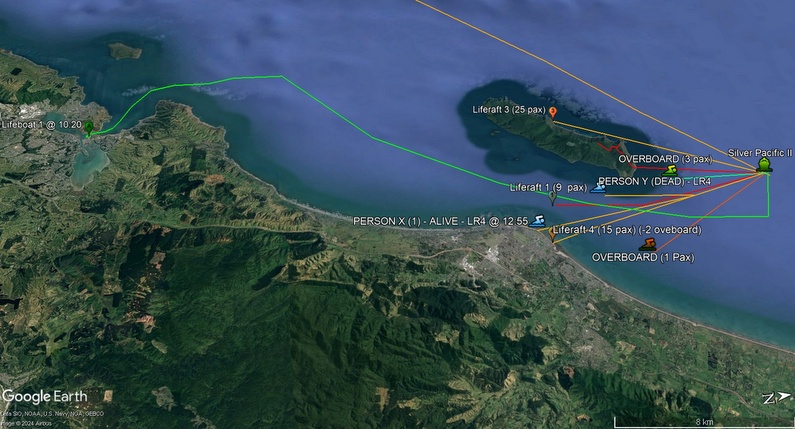
Focus on lead agency collaboration during Exercise Whakarauora Tangata
The third phase of Exercise Whakarauora Tangata was conducted in Wellington on 20 March, and brought together over 70 personnel across multiple agencies.
The exercise focused on a police-led multi-agency Incident Management Team (IMT) supporting a Category 2, RCCNZ coordinated incident response. A boutique cruise ship with 256 passengers and crew enroute to New Zealand was forced to evacuate north of Kāpiti Island. The exercise centred on the functional management of the passengers and crew, addressing their medical and welfare needs plus customs and immigrations issues. The IMT provided coordination regarding foreign embassy questions, such as those related to foreign diplomats, disaster victim identification and management of human remains, plus the reconciliation of all passengers and crew.
On 17 April, a Stakeholder / Lead Agency Workshop was held. The aim of the workshop was to identify the requirements for effective higher level incident coordination and management during a Nationally Significant SAROP - how these would be implemented and may change over time. Participants were presented with the scenario of a charter aircraft which crashes while on a flight between Wellington and New Plymouth. The aircraft was transporting a foreign industry delegation, a party of third country investors, senior businesspeople, and an associate minister.
Multi-agency groups were asked to consider a range of questions that would guide the structure of the response in terms of the strategic and operational leads, and how agencies would collaborate to manage the likely consequences. Following plenary discussions, the groups were provided with further developments, which included mass fatalities, and asked to consider how the response might need to change and what would need to be considered from a consequence and risk perspective.
Feedback was that the workshop provided a better understanding of the National Security System, the functions of Watch Groups and ODESC, plus the roles of strategic and operational lead agencies. Both the exercise and the workshop also provided great opportunities for participants to further their understanding of what other agencies contribute and how they would be involved in a Nationally Significant SAR event.
The National Security System
The National Security System is activated if a situation is sufficiently complex or significant that it needs national coordination and response. The National Security System is activated by the Department of the Prime Minister and Cabinet. Watch Groups are formed in response to a potential, emerging or actual event, and comprise senior officials of agencies relevant to the situation.
When necessary, the Officials Committee for Domestic and External Security Coordination (ODESC) is convened. ODESC composes the Chief Executives of the relevant agencies. Together they provide all-of-government coordination to ensure the lead agency and agencies in support have the resources and capabilities to respond to a situation.
Learn more at www.dpmc.govt.nz/our-programmes/risk-and-resilience/odesc-system-during-crisis
Feature image: An illustration of the exercise-play movements of passengers and crew once the Master of Silver Pacific II ordered the ship to be abandoned. Google Earth Screenshot, Data SIO, NOA, U.S. Navy, NGA, GEBCO. Image (C) 2024 Airbus.
This story was originally published in the June 2024 issue of Link magazine.
